In a perfect world, no right-minded audiophile would ever throw away his or her equipment boxes. None of us live in a perfect world and, for many of us, storage space comes at a tremendous premium. How to manage your boxes in the short term, as well as for the long haul, is worthy of consideration for any audiophile in the hobby today, even if we have ample attic, basement or otherwise suitable box storage space.
For 30 years, I have lived in Los Angeles and, for all of those years, I have had an audiophile system that has required some configuration. My 1993 just-got-to-college system featured a highly impractical Naim Audio NAIT 3-watt integrated amp and some modest Celestion 3 speakers that I won in a sales contest back in Philly at Bryn Mawr Stereo. I also was rocking the affordable yet legendary Rotel CDP-805 Compact Disc player, with its requisite Audio Alchemy DDE-1 small-format, audiophile DAC. While this system was small, even these boxes were hard to manage in an in-the-ghetto (and my Mama cried …) dorm room. For the same logistical reason, I loaded my pride and joy Compact Disc collection of about 500 discs into Case Logic binders that held 100 discs per, while the empty plastic jewel cases sat back in Philadelphia, waiting pointlessly in an IKEA Billy bookcase. I couldn’t predict how lucky that move was, in that during freshman year spring break, all five of the binders were stolen out of my room. USAA Insurance, upon seeing a photo (that actually needed to be developed and then mailed in for the claim), actually paid on the retail “replacement value” of each and every album. That lump sum of money, at the time, was like winning a small lottery as a soon-to-be college sophomore. I rebuilt my music collection slowly again, but I never missed the point of how lucky I was to have made the decision to leave my jewel cases back at college, even if L.A. was destined to be home.
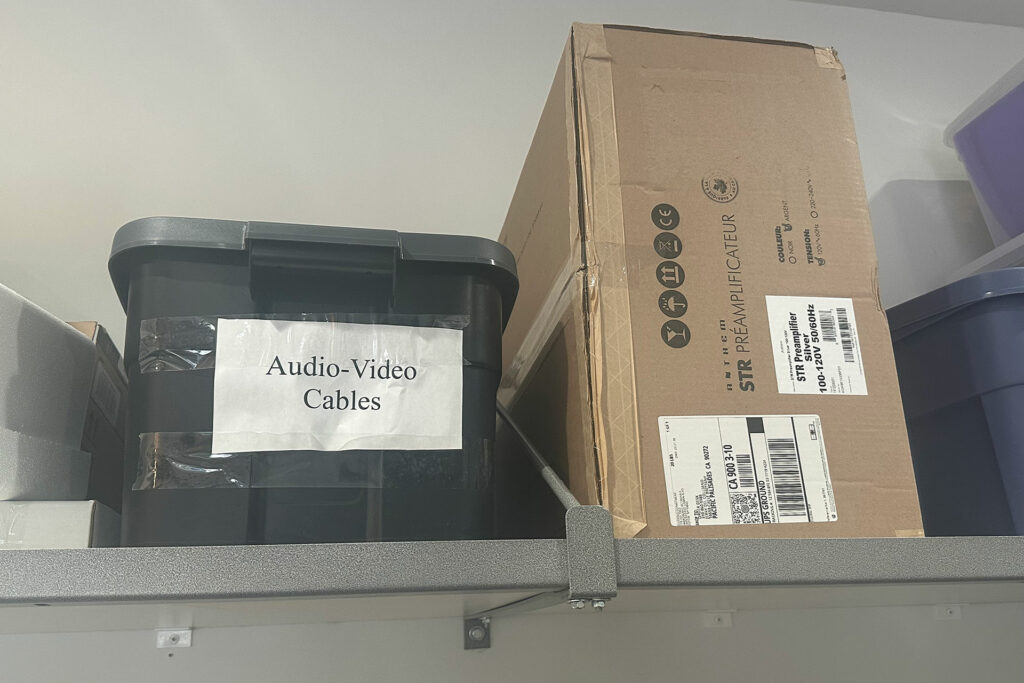
When is it OK For You To Toss an Audiophile Box?
First off, we would hope that you would recycle the box and its packing materials, but we digress. If you don’t have the room for a box and the product is easily shipped in a different box, then you might consider tossing your audiophile component’s box. If you think that you might keep a product for a long time and not really expect much value from it down the road, then you might dump the box. Audiophile cables can cost a fortune, but do you really need to save the boxes? Can you hurt an audiophile cable in shipping? Perhaps, but that would take some serious effort/neglect on the part of the shipping company.
What Are the Advantages of Keeping Your Audiophile Boxes?
I’ve told this story before, but it is worthy of going back to “Audiophile Story Time with Jerry” when it comes to this tale. When we sold our house at the top of Mandeville Canyon in the Brentwood neighborhood of West Los Angeles, I owned a pair of Paradigm’s best speakers that weren’t going to work in my new environment. I tried to keep the original Paradigm shipping boxes, but they became water-damaged and couldn’t possibly be used when I needed to pack them up. The speakers that I owned were current, and Paradigm kindly shipped me fresh boxes and packing material, flat-packed, at a very fair price. Not because I was smart, but because I was a combination of lazy and busy with the move, I had the local Paradigm dealer, Shelley’s AV, come out and actually pack the speakers that I sold to an audiophile who lived out of town. Shelly’s did a great job and even dropped off the speakers to FedEx for me, as they were pretty bulky and heavy in the boxes. The next week, I unexpectedly received one of the speakers with about one-third of the box and, a few days later, the other speaker also destroyed with zero box intact. FedEx, predictably, tried to deny the claim, as this is why I retell the story. I used factory boxes and had an authorized dealer do the packing, plus I insured the speakers for retail price (another worthy small increment that pays for itself very quickly as soon as you have any kind of problem). FedEx ultimately paid up, leaving me feeling fortunate once again.

Make Sure That You Can Deny Responsibility When Shipping Audiophile Gear
Unless you have the factory box and perfect packaging, you are better off using the box and ship place to help you with your logistics, as they are shipping professionals and you and I are not. You see how this move helped me with my old Paradigms and it can help you too in the future. The incremental costs of having a professional pack your shipment is worth it the first time that you have a problem, because the shipping companies will all try to fight you on the claim. That’s how they roll, so you need to know that going into the deal.
Always Get a Receipt for Your Boxing and Shipping
We learned some additional best practices details for shipping, as I’ve lost two somewhat valuable items this year that I sold on eBay.com. Tip No. 1 – take your products to the shipping location for your specific shipping company. Why is this important? Because The UPS Store can take your FedEx package as a “courtesy,” but what happens if somebody sees a box saying Audio Research XYZ123 Power Amp and decides to swipe it, as it has the potential to be valuable? With no receipt and the item not “tendered” (that’s the shipping term for getting the item into their system), then you are hosed like I was twice this year. Tip No. 2 – Always Get a Receipt, as that FedEx receipt for your FedEx package is proof that you tendered it, and that is key for you to be off the hook for the product if it were to go bye-bye. You also might need to prove that you paid the box and ship place for the box, too, if they did the packing for you. Having proof of this can save you a lot of time when fighting with the shipping company’s insurance department, which is taught to deny-deny-deny. To beat them, you need the facts and proof on your side, and the box receipt is key evidence.
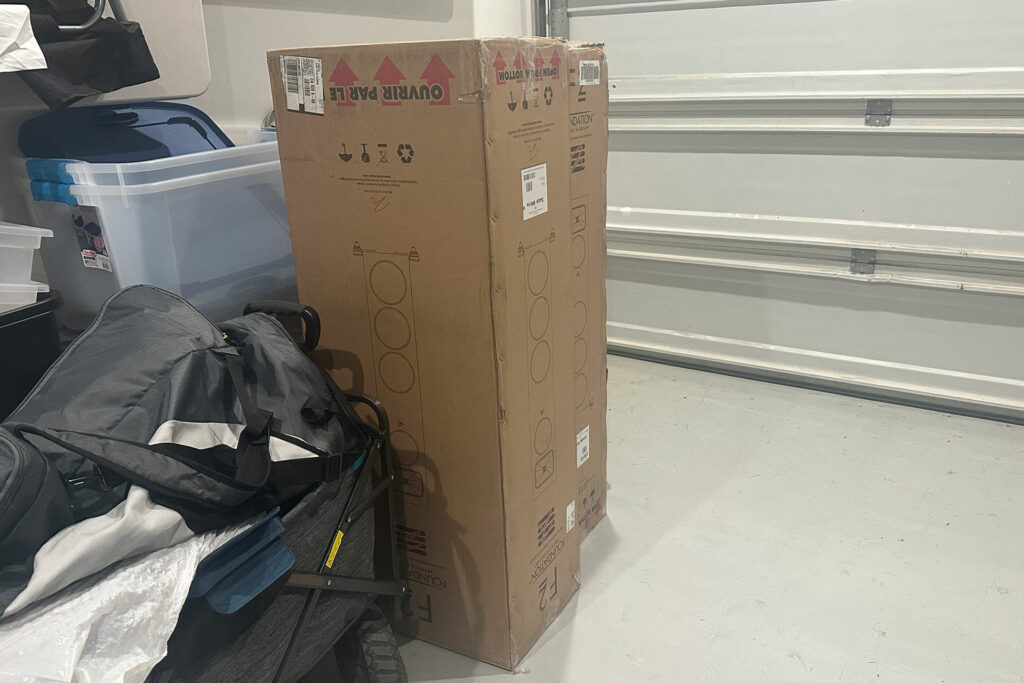
Beware of Basements
AV boxes and basements go together like peanut butter and chocolate, but basements can get wet just by their subterranean nature. Perhaps invest in some wooden shipping palettes that might not cost much at all to keep your cardboard boxes up off of the potentially wet or damp floor.
A little plastic wrap goes a long way, too, if you are looking for a low-cost smart tip. I just got a $5,000 CD transport in for review via DHL, as it came to me from Singapore. The box was packed fantastically, but it was also wrapped with plastic. This took an extra 60 seconds to remove, but was a savvy move on the part of this audiophile company located halfway around the globe. Perhaps you can steal a move from them and get some plastic wrap from the kitchen and protect your long-term boxes, so that you can maintain them for years and years to come.
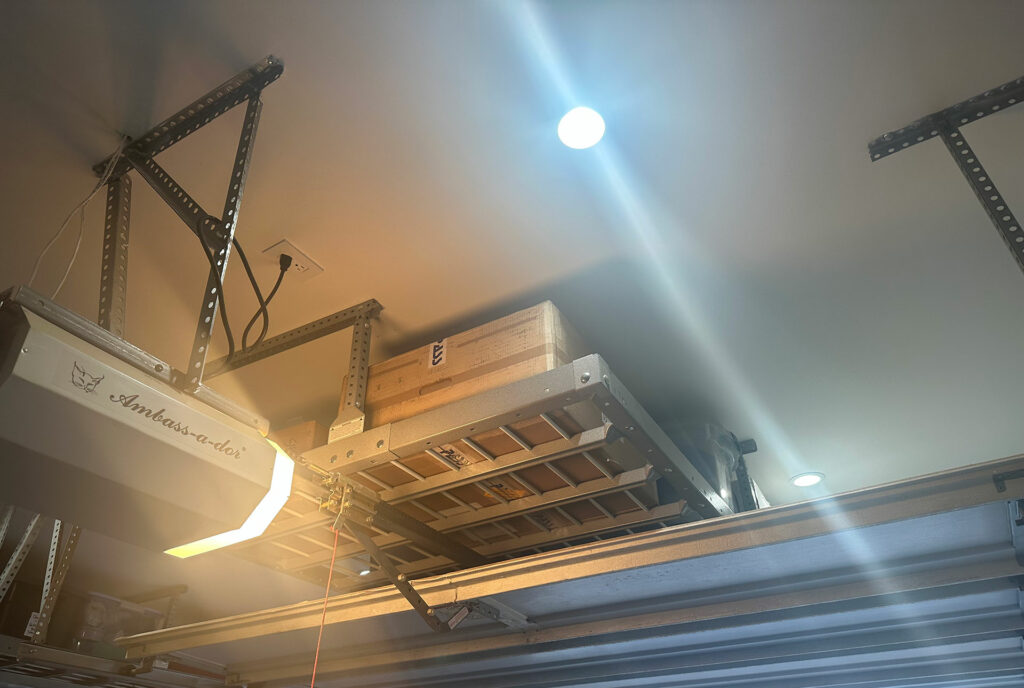
Look Into Professional Organization Hardware and Solutions
There are DIY products in this space from Lowes, Home Depot and Amazon, but I spent the money to have a company come out and install an entire system for storage in my garage as, even in a 3,800-square-foot home, there just isn’t that much room to store boxes in said McMansion. I’ve got my Bowers & Wilkins 802 D4 boxes (read the review) up in the attic, but let’s hope that I never need to put them back in those boxes. I have many more products coming in and out of my system that are on less permanent display. These boxes can get stored above my cars in my garage, which turns useless space, where the chain-driven, 30-year-old garage door mechanism is, into useful shelving. Now, I’ve got Halcro, Marantz and multiple Pass Labs boxes just chillin’ up there, out of the fray. The pro storage rack installation might have cost me in the neighborhood of $2,000, and it is so well done that my fat ass can hang from the metal bars without fear of ripping the racks down and killing a Mercedes directly below. Over time, a solution like this might actually pay for itself, especially when considering the cost and downsides of external storage facilities.
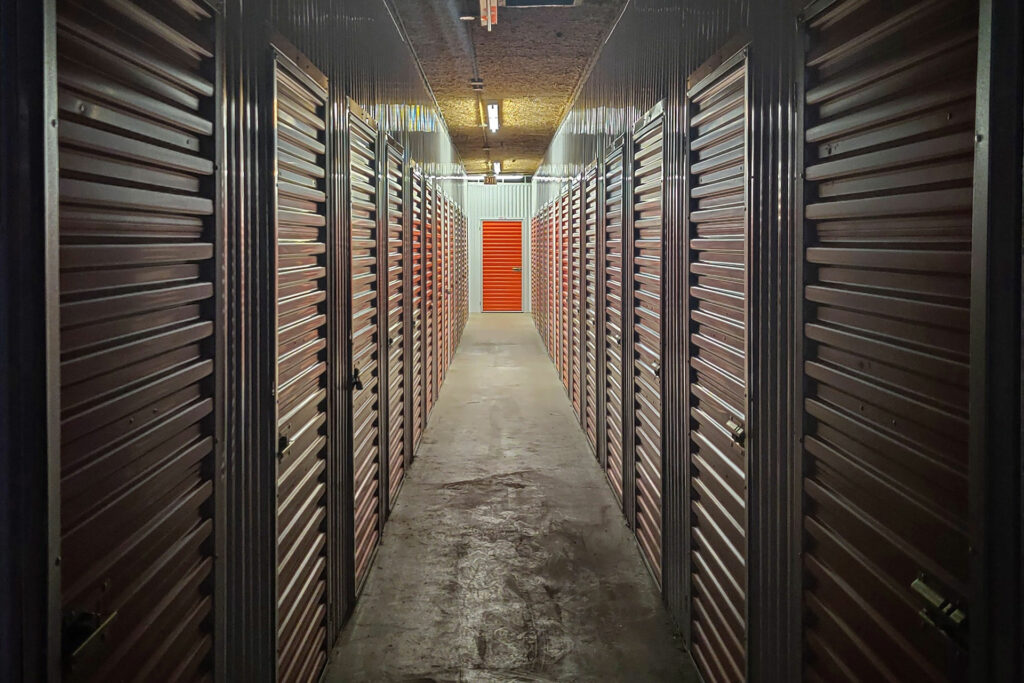
Beware of the Storage Unit Place
We’ve moved more than we would have liked to in the past 10 years. During one period between our last home and our current one, we put much of our belongings in a storage facility in Santa Monica. It was anything but cheap. but we were willing to pay a premium to keep our stuff close, as opposed to saving $100 a month with our material possessions stored out by the 10 and 15 Freeways in Fon-tucky. I paid in the neighborhood of $750 per month for the Santa Monica first-floor storage space, and when we finally were able to move out of their facility, our possessions were literally and irrecoverably covered and stained with rat shit. I am not joking. Our sofas were destroyed. A number of AV boxes, too, but they weren’t that critical in this case. I would want to know what kind of insurance that these often low-cost facilities have, because you could be stone-cold wasting your time with this option.
And in case you need to take this story to another level of disturbing, I know of someone who had a full audiophile system that got infested with bed bugs. You read that right, and if you had to gulp a bit, I can’t blame you. He took the boxes and the nearly $10,000 relatively modern MartinLogan ElectroMotion ESL speakers (at the time) along with matching McIntosh electronics and simply let them sit out so that the bed bugs could die or go infest something else. This wasn’t me, by the way, but needless to say, we got rid of the rat shit-stained sofa for a new one, even though I had to take a $4,000 unexpected expense from Room and Board on my credit card. It was better than catching the actual plague from my storage mistake.
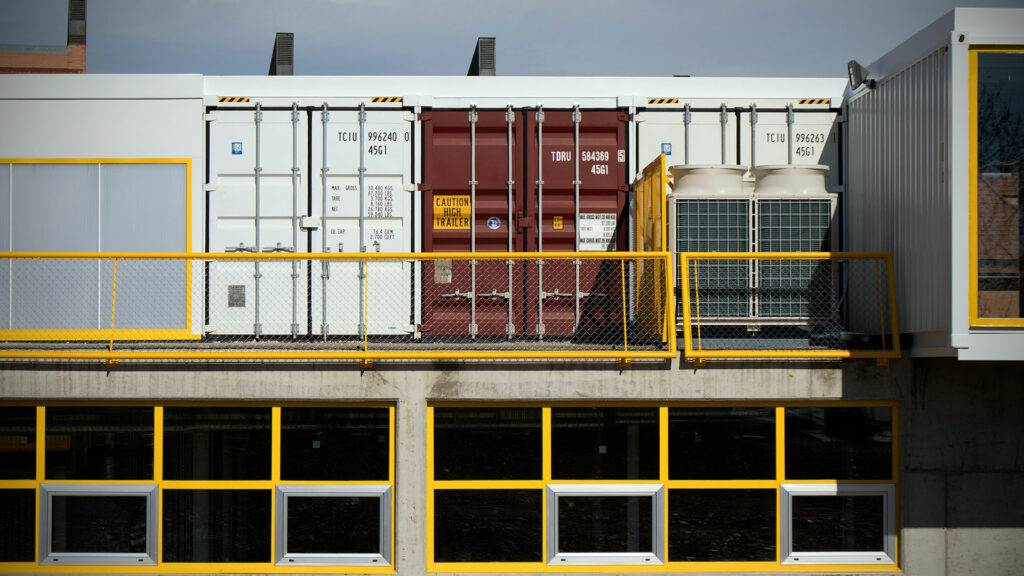
Are Mobile Pods a Viable Solution for Audiophile Box Storage?
My long-time friend and former writer, Dr. Ken Taraszka, took a year off here in the U.S. to work as a physician in New Zealand for a year. He had sold his home in Florida, and his parents were taking care of his dogs, so he ordered up a Pod, which is a mobile storage unit that they drop off to you and pick up when you are ready for your gear back.
One big problem with Pods is that they are an all-or-nothing proposition in terms of extracting one or a few boxes. If you need one AV box, you need to get your whole Pod back, which can be logistically difficult and potentially expensive. A storage facility would allow you access to a more granular part of your stash, but we’ve already covered the significant downside of these establishments.
In the end, where you live has a lot to do with how viable it is to keep your boxes and crates. Those who live on farmland can use a nearby (dry) barn or install an affordable storage unit on their property. Those who live in an Upper Westside one-bedroom apartment will have much more serious trouble trying to hang onto boxes and packaging for easy-to-understand reasons. Each of us will need to make our own decisions in that, say, $150-per-month for a storage unit in Santa Monica large enough to store all of your boxes. How long do you need to keep your boxes before the next component upgrade that you make justifies you going to the box and ship place and paying those folks to give you a professional boxing? Even for complicated products like a pair of Wilson WATT Puppy speakers that I once sold, I was able to get crates made, the speakers perfectly wrapped, and custom foam made, so that the truck ride from Los Angeles to Virginia was a non-factor. That cost me a little over a grand, but the factory crates were huge, didn’t break down easily, and are really designed for the delivery of the speakers, not the secondary shipping of them. Try not to waste good money after bad, especially if your best interests are served best by tossing some or all of your audiophile boxes. We know it is painful, but wasting enough money to upgrade your system a few extra times is even more painful, right?
How do you deal with your boxes, storage and shipping? We want to hear from you in the moderated comments below.




The pull down stairs to my attic are based on the width of the ceiling joists, 16 inches on center. Roughly half of my boxes are too large to fit through the space. Add to that I have a growing number of plastic totes, maybe about a dozen(?), crammed full of CD’s (yes, like a good boy I follow the rules and save the CD’s copied to my music server) I’m not completely sure I could even lift above my head and carry up those precarious fold down stairs to even get them to the attic. And my entire attic, except for a small storage area, is full of insulation totaling almost two feet thick. So the available room in my attic for large stereo boxes is not practical. I have invested in an off site storage company that is climate controlled. All my stereo boxes, along with all my CD’s, a variety of holiday decorations and several pieces of furniture I’m not using live happily in their 12 x 12, $138.00 per month heated and cooled room. And that’s NC prices, other areas of the country may be different. I have thought several times about installing storage racks above my garage door but I don’t know, I can’t seem to get excited about that. It would be a solution for probably all of my boxes but the CD’s? Not so sure about hefting them up in the air perched on top of a six foot ladder. And given the height of my garage, a six foot ladder might not be tall enough. I tell myself I’m saving that space to install a car lift to enable me to change my garage so I can add a really hot sports car but that doesn’t seem likely anytime soon. So for now, the storage room works and is out of sight, out of mind.
Great Article…and an important subject…..speaking of boxes and their importance to resale and obviously shipping, I started this thread on SHF to share my experience in getting custom made boxes to replace boxes that have been lost, thrown away or damaged.
https://forums.stevehoffman.tv/threads/boxes-for-your-gear.1193174/
It is worth noting that most shipping services make extremely difficult to get reimbursed for damage… even with a factory box… if you haven’t read the fine print, you should as there are many reasons for denial…. such as receipts, proof of payment, use of acceptable double wall boxes, use of two boxes, use of approved packaging materials… in other words, they really make it difficult… not impossible …to collect on a legitimate problem.
For absolute certainty you probably want to consider the UPS pack and ship option… not cheap but a much better chance for reimbursement if there is a problem.
https://www.theupsstore.com/about/pack-ship-guarantee
Ron,
I agree with you.
Having a pro pack your stuff in FACTOR or “professional boxes” REALLY HELPS your cause if the event that you need to make a claim.
ALL AUDIOPHILES should expect ANY SHIPPING COMPANY to fight them on a claim thus following some of my tips is key to future success…